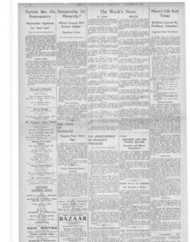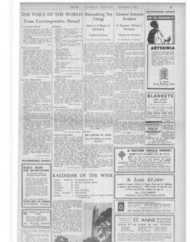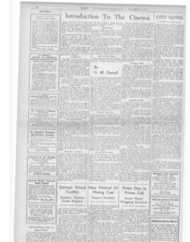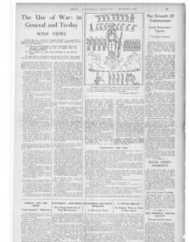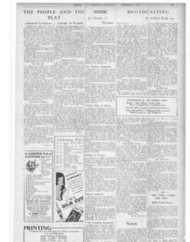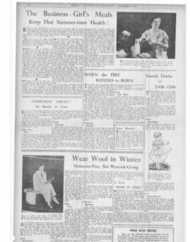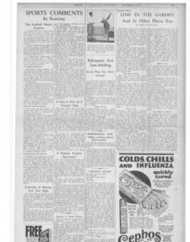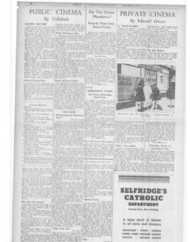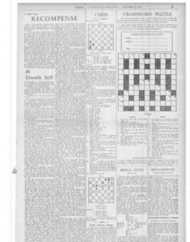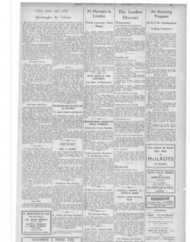Page 1, 25th October 1935
Page 1
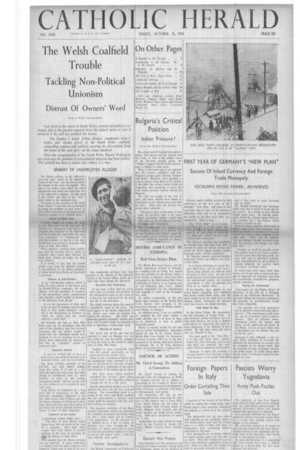
Report an error
Noticed an error on this page?If you've noticed an error in this article please click here to report it.
Tags
Share
Related articles
" Clouded Valleys"
Hotel-keepers And Unemployed Protest Against 8s. 6d. "...
Industrial Revival Or Ruin?
A Communist South \vales
Ghosts March
The Welsh Coalfield Trouble
Tackling Non-Political Unionism
Distrust Of Owners' Word
From a Wehh Correspondent
_Last week in the mines of South Wales emotion triumphed over reasons and at the present moment from the miners' point of view it seems as if the end has justified the means.
On Sunday I heard Arthur Horner, communist miners' leader, and stormy petrel of the South Wales coalfield, counselling caution and publicly avowing his dissociation from the views of his own party on the issues involved.
Since the reorganisation of the South Wales Miners' Federation two years ago, the problem of non-political unionism has been tackled. The method has been to isolate one colliery at a time.
BRIBERY OF UNEMPLOYED ALLEGED The Finlyn colliery in the anthracite area—the only centre of the Industrial Union in that area--was the first to which the weapon of the strike was applied. The men at the colliery were called out when negotiations had failed and were kept out at the federation's expense. In that case it cost £8,000, and there is no " scab " union centre in the anthracite area. . The policy of the executive of the South Wales Miners' Federation was to continue to tackle the problem in each centre in turn without resorting to the impracticably expensive weapon of a coalfield strike.
Struck on Their Own However, things had reaclud the pitch at Nine Mile Point that the men took the initidtive of " staying-in," and before ihe delegates and executive of the federation had lime to take any responsible step, men were " staying-in" or " stopping-out " all over the coalfield, so that in a few days 50.000 men were striking in sympathy with those at Nine Mile Point.
When delegates returned from conference with the decision not to strike in sympathy they found their electors, in many cases, already on strike, on their own initiative.
It is worthy of note that the trouble chiefly arose froni the situation existing at the collieries of the Ocean company, of whose board Lord Davies of Llandinam is chairman.
Violence at Tall-Merthyr At the Taff-Merthyr colliery, which is under the joint control of the Ocean and the Powell-DyfTryn companies, the mine officials, with the assistance of members of the non-political union, overpowered and removed a small number of members of the federation from the pit.
If was the appearance of these men at 11w pit-hank in bandages and showing signs of their rough treatment. which led to the disturbances at Trelewis, in which th..• police and the crowd suffered a good deal.
On Saturday the men at Nine Mile Point came up. in accordance with the wish of the executive, who had received assurances that the colliery would he closed until the federation should have prepared its list of workmen to he employed there—determined by seniority— and that no " non-pols " should be employed again,
Imported Labour
h must be realised that in most of these centres non-political unionists were imported labour, and not local labour.
Mr. James Griffiths, president of the S.W.M.F., and other miners' leaders, assert that bribes of £5 and Is. a day above the legitimate rate of pay have been offered to .unemployed men in other localities in order to get outside. unorganised labour. Bribery of this kind has been going On over a period of some eight years.
Lord Davies of Llandinam in a long letter full of expressions of the most admirable sentiments addressed to the Rev. John Evans, vicar of Risca, says that the Ocean company, of which he is chairman, whose pits have been the centres of erievance, has always allowed freedom of choice of union to their employees.
Comment on the Letter A prominent Labour leader said :—
" The letter of Lord Davies indeed leaves those who are aware of the facts in a quandary. They must either assume that Lord Davies is entirely ignorant of the facts, or, knowing the fjetki.s, he chooses to deny them."
asserted that the Ocean company was not impartial. It makes deductions, it is alleged, from the men's wages for the Industrial Union, and. in spite of the deco Also undeniable privileges have been granted to the officials of the Industrial Union at the various offices, which privileges have been denied the federation.
Executive Not Understood
it was quite evident that the executive's plan of tackling the problem of the non-political union at one centre a time was riot understood by tlw rank and file of the federation.
The whole situation shows the need of a sympathetic organ of the press. The local papers, if not clearly antipathetic to the miners' case, make no attempt to explain the situation. The B.B.C'e has given the, position unusually faithful pub, licity, but it could hardly he expected to help in operating a trade-union tactic.
Distrust of Owners One reason why all the men had not returned to work on Monday was that they could not trust the colliery company to keep its word in the proposed settlement at Nine Mile Point.
Nothing is more remarkable than this—the general questioning on the men's part of the owners' word.
There is now a tendency to believe that the spontaneous strike continued in defiance of the executive's direction brought the owners to a realisation of the extent and bitterness of the feeling against them.
One other factor which doubtless res.trained the executive from calling a strike itself is the impending national struggle for the 2s. a day extra.
Several authoritative leaders arc of the opinion that there will not be a national stoppage. The non-political union is so strong in the Notts and Derby coalfield that the inconvenience a national strike entails could be negatived with that coalfield working to capacity.
The executive committee of the Mineworkers Federation, which was authorised by a delegate conference last Friday both to take a strike ballot and to conduct " any negotiations" on the demand for an addition of 2s. a day to wages, on Monday saw Capt. Crookshank, the Secretary for Mines, and stated its views on what the government might do to meet certain of the miners' claim. Little has been officially made public.
blog comments powered by Disqus



